An excerpt from the Annual Report of the Commissioner of Indian Affairs to the Secretary of the Interior for the fiscal year ending 1878, containing reports on the Indians at the Hampton Institute and a report by Lieut. Richard Henry Pratt regarding the recruitment of students for that school. Both reports discuss the education of students at…
Hampton Normal and Agricultural Institute
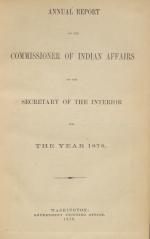
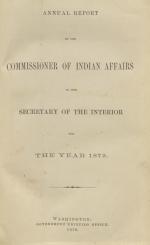
An excerpt from the Annual Report of the Commissioner of Indian Affairs to the Secretary of the Interior for the fiscal year ending 1879, containing the Commissioner's report on Indian education. That report discusses the founding of the Carlisle Indian School under the command of Richard Henry Pratt, the school's location and campus, and…
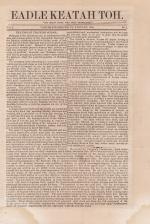
The first page opened with an article titled "THE INDIAN TRAINING SCHOOL," that described the progress of the school, its Christian methods, the work of the former Ft. Marion prisoners of war preparing buildings for use, the importance of the town Sunday Schools, the school curriculum that emphasized farmwork for boys and housekeeping for girls…
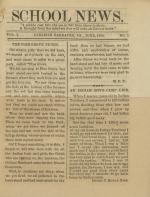
The first article by M. D. P. [Mason D. Pratt] describes a field trip to an iron forge near Pine Grove, followed by a picnic at the grove with the students, teachers, visiting chiefs, the college band and some invited guests. “An Indian Boy's Camp Life,” by Henry C. Roman Nose, gives a short account of his activities growing up. An "Editorial"…
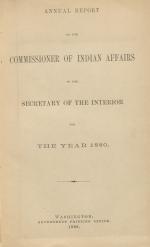
An excerpt from the Annual Report of the Commissioner of Indian Affairs to the Secretary of Indian Affairs for the fiscal year ending 1880, containing the first annual report of the Carlisle Indian School. The report discusses the school's opening, recruitment of students, educational and industrial curricula, and overall health. Also included…
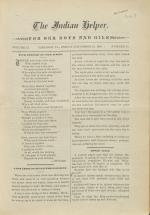
The first page opened with a poem titled "Much Depends on Your Aiming," about keeping to the straight path, followed by "A Boy Froze to Death While On Duty," about the effects of an ice storm on Lake Michigan followed by "Moved Again," in which the Man-on-the-band-stand opined that Indians who are not educated have no say in decisions made…
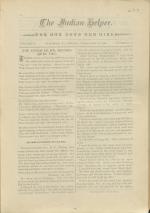
The first page opened with the poem, "You Conquer Me, Me Conquer You" followed by a letter from Rev. Edward F. Wilson of the Shingwauk Home titled "An Indian School in Canada," which described Wilson’s report to the Indian Department of Canada on his visit to Carlisle, the Lincoln Institute and the Hampton Institute. It continued on the last…
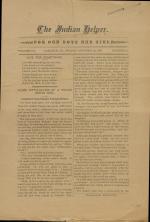
This issue began with the poem, "Live for Something," followed by the continuation of the series begun in Number 8 entitled "Home Difficulties of a Young Indian Girl," about Fanny, a Carlisle alumnus struggling to apply her new-found skills to home life. The second page featured news items including a report from the Hampton School in…
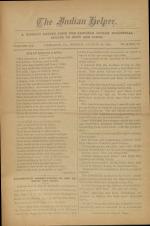
The first page opened with the poem, “What Makes A Man,” followed by an article titled, “Interesting Observations At the Indians’ Own Home” reprinting a letter from Joshua Given (Kiowa) who described the social and political news from the Kiowa and Comanche Agency. He reported the activities of students who had returned home from Carlisle. The…
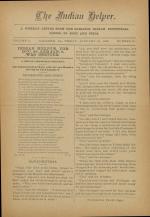
The first page opened with a notice that there were no Indian Helper newspapers published for December 28 and January 3rd. A notice followed: “A Novel Christmas Present: Our Superintendent Made with his own Hands a tin Cup for Each Employee.” Next was a poem, by “E.G.“dated Dec. 25, ’89 titled “The School Poet Again Stirred” about…
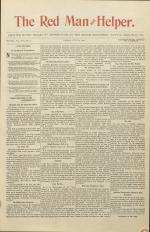
A description of this document is not currently available.
Note: This issue was also published as The Red Man (Vol. 16, No. 5).
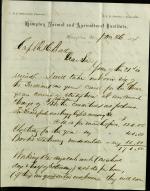
Samuel Chapman Armstrong writes to Richard Henry Pratt discussing the costs and terms for six Indian students under Pratt's care at the Hampton Normal and Agricultural Institute, including fees, working wages, and hours. Armstrong also discusses the challenges of running Hampton, and asks whether the potential students could be brought from…
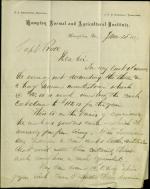
Samuel Chapman Armstrong notifies Richard Henry Pratt of a calculating error in a previous letter about student fees at Hampton. Armstrong also asks whether Pratt himself can come with his students to Hampton.
Note: This letter is misdated 1877, but it is actually from 1878, referencing a previous letter. See the letter "…
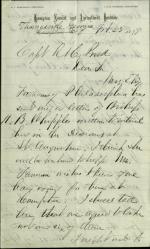
Samuel Chapman Armstrong writes to Richard Henry Pratt informing Pratt of a letter written by Bishop H. B. Whipple and forwarded to Armstrong by Elizabeth Farmer. Armstrong asks Pratt to write to Bishop Whipple for support and to invite him to visit Hampton.
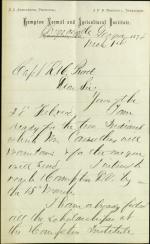
Samuel Chapman Armstrong writes to Richard Henry Pratt confirming plans for the arrival of ten of Pratt's students under the care of Mr. Caruthers, and discusses scholarships for those students.
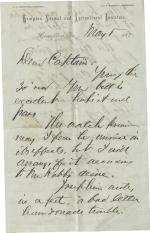
Samuel Chapman Armstrong of the Hampton Institute writes to Richard Henry Pratt discussing some student affairs at Hampton. The letter is partially dated, so the year is uncertain, but likely dates from the period when Pratt worked alongside Armstrong at Hampton.
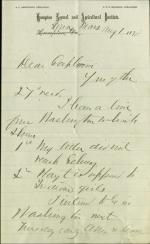
Samuel Chapman Armstrong informs Richard Henry Pratt that he has received a telegram from Washington, indicating that a previously sent letter was not received and that Commissioner of Indian Affairs Ezra Hayt is opposed to educating Indian girls. Armstrong notes that he will go to Washington to discuss the matter in person.
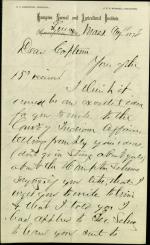
Samuel Chapman Armstrong writes to Richard Henry Pratt encouraging him to write to Commissioner of Indian Affairs Ezra Hayt to share Pratt's ideas about an Indian school. Armstrong provides some advice to Pratt about downplaying Pratt's views about Indian girls' education, how to find political allies in Washington, and how to play towards Hayt…
![Armstrong Informs Pratt That Recruitment Can Begin [Version 1] Armstrong Informs Pratt That Recruitment Can Begin, 1878 [Version 1]](/sites/default/files/styles/views_taxonomy/public/image-document/YALE_WA-MSS-S-1174_b01_f011_7_1.jpeg?itok=83Ev-tG0)
Samuel Chapman Armstrong writes to Richard Henry Pratt informing him that Commissioner of Indian Affairs Ezra Hayt has approved Pratt's idea to recruit Indian youth to attend the Hampton Institute. Armstrong discusses the construction of a new building to house them, and asks Pratt to have photographs taken of the party for promotional purposes…
![Armstrong Informs Pratt That Recruitment Can Begin [Version 2] Armstrong Informs Pratt That Recruitment Can Begin, 1878 [Version 2]](/sites/default/files/styles/views_taxonomy/public/image-document/YALE_WA-MSS-S-1174_b01_f011_8.jpeg?itok=U2czM5aB)
Samuel Chapman Armstrong writes to Richard Henry Pratt informing him that Commissioner of Indian Affairs Ezra Hayt has approved Pratt's idea to recruit Indian youth to attend the Hampton Institute. Armstrong discusses the construction of a new building to house them, and asks Pratt to have photographs taken of the party for promotional purposes…
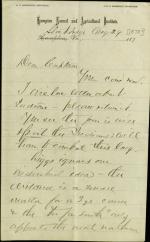
Samuel Chapman Armstrong writes to Richard Henry Pratt enclosing a letter of concerns, potentially from Diggs, about Indian education. The enclosure is not included in this file, but Armstrong outlines some of the concerns, including that "we'll spoil the Indians" as well as opposition to industrial training and the southern location of Hampton…
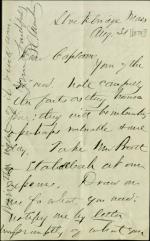
Samuel Chapman Armstrong writes to Richard Henry Pratt authorizing travel expenses for Mrs. Pratt and Etadleuh to recruit Indian youth for Hampton alongside Pratt. Armstrong also discusses some opposition that he and Pratt will face in their work.

Samuel Chapman Armstrong of the Hampton Institute sends Richard Henry Pratt encouragement ahead of a recruitment trip to the West, and suggests using photographs from Hampton to help in his efforts.
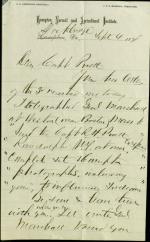
Samuel Chapman Armstrong writes to Richard Henry Pratt informing him that he telegraphed instructions for Pratt to be sent a complete set of Hampton Institute photograph to be used in his recruitment efforts. At this time, Pratt was preparing or had already left on a recruitment trip. Armstrong also notes that he sent a photograph to Spotted…
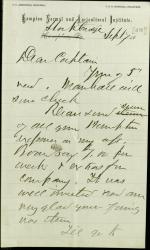
Samuel Chapman Armstrong of the Hampton Institute sends Richard Henry Pratt information on expenses for his recruitment trip in the West. Armstrong also notes that he cannot visit Carlisle yet, but will plan to do so.
